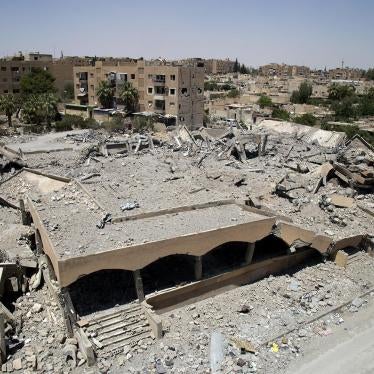A five-day ceasefire in Yemen ended last night and the Saudi-led coalition has resumed airstrikes against Houthi forces, at least in the southern port city of Aden. With the resumption of hostilities, all parties to the conflict should take greater care to minimize harm to civilians and investigate alleged laws-of-war violations.
We’ve spent the last few days in Saada, the northern stronghold city of the Houthis, also known as Ansar Allah, whose takeover of the capital, Sanaa, and other parts of the country prompted the 10-member coalition to launch its campaign. After over six weeks of airstrikes, the city is littered with craters, debris, and destroyed buildings. While security offices and other structures were clear military targets, we documented several strikes on residential buildings, and markets without an apparent military objective that have killed and wounded civilians. On May 6, for example, a bomb struck a residential home in Saada, killing 27 members of one family, including 14 children. Bombing has destroyed at least four markets in Saada, making it harder for people to buy food.
Further attacks on electricity and water installations as well as food storage centers may have had a military justification, but the short and long-term harm to civilians may have far exceeded any military gain.
According to the United Nation Office of the High Commissioner for Human Rights, by May 12 the fighting had killed 828 civilians in Yemen, many by airstrikes. Human Rights Watch has documented several apparently indiscriminate airstrikes resulting in civilian casualties, including one on a camp for displaced people 6 kilometers from the Saudi border that killed at least 29 civilians, and another that repeatedly struck a dairy factory that killed at least 31 in the western port city of Hodaida.
We have also documented that coalition forces have used banned plane-dropped cluster munitions in the Saada governorate. In addition, we have reported on the Houthis firing unguided rockets into the city of Najran, across the border in Saudi Arabia, killing at least 12 civilians. Both sides have put civilians and hospitals at unnecessary risk in the heavy ground fighting in Aden.
Abiding by the laws of war doesn’t mean the end of all civilian casualties during armed conflicts. But ensuring that attacks only target combatants and otherwise acting to keep civilians away from the danger and reduce their likelihood of being attacked is crucial for warring parties to minimize civilian loss.









